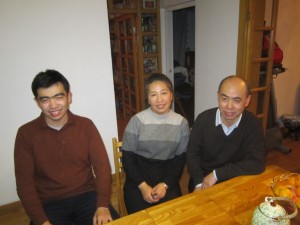In Beijing, families experiment with low-carbon living

BEIJING - Standing in his cramped bathroom, 51 year old Beijinger Duan Wudong proudly shows off the gleaming new pipes and pumps built to transfer waste water from his shower and washing machine into the family toilet. “I didn’t used to think about the environment when making home improvements,” Duan said. “But this year I’ve taken a more environmental approach.”
The Duans are one of 21 families in Beijing taking part in a “low-carbon family” scheme, run by a Chinese NGO, Friends of Nature. Each family gets a subsidy of 10,000 RMB (about $1600 USD), and advice on reducing carbon emissions around the home. “We want to learn how easy it is for ordinary families to buy low-carbon products,” Zhang Hehe, one of the scheme’s organizers, said.

The three-person Duan family spent their entire subsidy, plus an extra 3000 RMB (about $480 USD) giving their apartment an environmental makeover. Most of the money was spent on the water-recycling system, which Mr. Duan says has cut his family’s water use by 50%. The Duans installed a solar water heater, and replaced all their light bulbs and their fridge with new, energy saving models. Other changes were more simple, like moving the table where Mr. Duan enjoys his morning rice-porridge into the kitchen, where there is more natural light.
Chinese people emit almost three quarters less carbon dioxide than Americans, on average. As members of Beijing’s lower-middle class, the Duans are not extravagant consumers. Their apartment measures just 80 square meters, and they have never taken a long-haul flight. So is it unfair for them to be asked to reduce their emissions?
“It isn’t about fairness - you need to set an example regardless of what other people are doing,” the Duan family’s youngest member, 25 year old Duan Chen, said. His mother, Duan Wuming was less certain about the necessity of reducing emissions. “I don’t think Chinese people have a duty to reduce emissions, but if they want to do it, it's a good thing” she said.
Mr. Duan lists his biggest environmental concern as water conservation, not climate change. “I’m most
worried about water shortages in Beijing,” he said. Mrs Duan seemed unsure about the dangers of rising greenhouse gas emissions. “Climate change is bad for the ozone layer,” she said, “and it will make Beijing a less comfortable place to live.” Mrs. Duan said that conserving resources was the most important reason for the changes they’d made around the home. “Electricity generation depends on coal, and that’s a limited resource,” she said. Climate change was higher on the agenda for the family’s youngest member. “I’ve never taken a driving test, partly because of worried about oil shortages and climate change,” Duan Chen said. “But my friends think I’m weird because I don’t want a car.”
For families like the Duans, China’s rapid economic growth has bought bigger incomes, increased consumption, and a rise in greenhouse gas emissions. Sales of consumer goods rose by more than 13% in China last year, while 70,000 new vehicles appeared Beijing’s roads alone. “Nowadays Chinese people recognise the need to think about the environment, but most people aren’t willing to make sacrifices,” Duan Chen said.
For most Chinese families, the attractions of increased consumption outweigh environmental ideals. The Duans have just bought their first family car, and even their new, energy efficient fridge is larger than their previous model. “Some of the families would have dropped out [from the scheme] without the subsidy,” NGO employee Zhang Hehe said, but she insisted that most of the families would have taken part without any financial incentive. “Without the subsidy, we wouldn’t have renovated the house in such an environmentally friendly way,” Duan Chen said.
Pictures: Wikimedia; Author.
This post was originally published on Smartplanet.com
